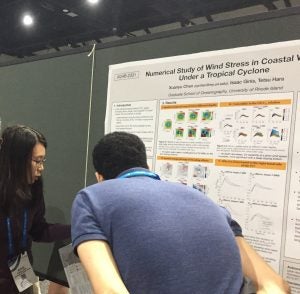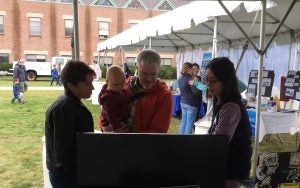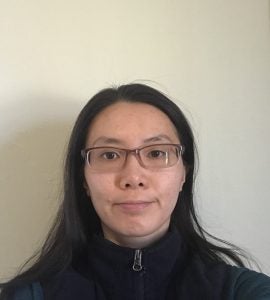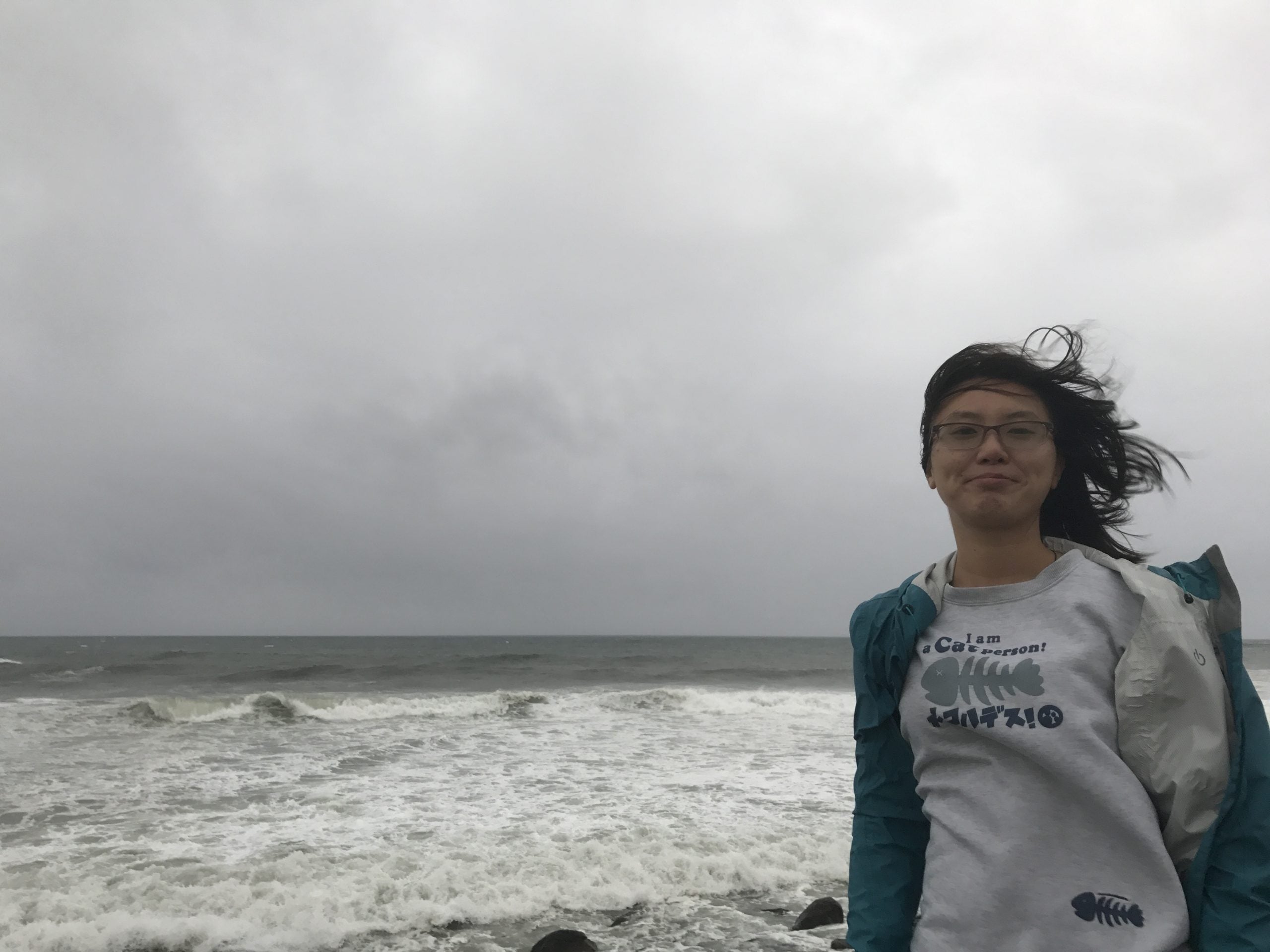May 25, 2021
Welcome to the sixteenth in our continuing series: GSO Profiles. Each post will feature a brief interview with a member of the GSO community. For the next few weeks we will feature GSO students who graduated over the past year. These profiles are one way we can celebrate the accomplishments of those graduating in this unusual time of COVID-19, and also welcome them to the ranks of GSO alums.
Having finished her Ph.D. work in August 2020 with GSO professors Isaac Ginis and Tetsu Hara, Xuanyu Chen continued working with them as a postdoctoral fellow. Since March she has worked remotely for the NOAA Physical Sciences Laboratory in Colorado and in a few weeks she will be there in person! Xuanyu has very wise words (see below) about letting your interests and questions guide your career.
Here’s Xuanyu in her own words:
GSOP: Tell us about your work/research at GSO: what question(s) are you trying to answer?

XC: At GSO, I worked on a project funded by the Department of Homeland Security to understand the impacts of ocean surface waves on storm surge. The key question I was trying to answer is that, as hurricanes make landfall, how are the surface roughness and the capacity of wind to move water modified by the shoaling of hurricane-generated ocean surface waves? And as a result, we wonder if there is any impact on storm surge.
GSOP: What is your favorite thing about your work?
XC: My favorite thing about my work is that it involves computer coding and adding new pieces into computer (numerical) models, which is fulfilling for me.
GSOP: What led you to your studies/career in ocean science?
XC: I came to ocean science in my undergrads half by choice and half by pure chance (a.k.a., how the college system works in China). I knew I would prefer to study environmental sciences and learn about nature, so one of the majors and universities I applied for was marine science at Ocean University of China (OUC). In my junior year at OUC, I was searching for meaning in what I studied. Growing up in southern China, my experience of typhoons helped me to make the connection between the ocean and extreme weather systems. Also, the practical aspect of numerical modeling and forecasting appealed to me at that time. Therefore, I chose to continue studying ocean science in the direction of physical oceanography.
GSOP: What brought you to GSO?
XC: It is mainly the narrow research topic on hurricane-ocean surface wave interactions I was interested in learning more about at that time. Only two research groups in the US had developed fully coupled hurricane-wave-ocean models back then. One was in RSMAS at the University of Miami, and the other one is here in GSO. Making the choice was easy because my Ph.D. advisor (Isaac Ginis) offered me the opportunity. Also, my senior project advisor in OUC recommended that I do my study with Tetsu Hara (my co-advisor) to understand the ocean surface waves.
GSOP: How have the COVID precautions affected you? What was it like defending your thesis virtually?
XC: Fortunately, my work had not been severely impacted by the COVID precautions because I could work from home with a laptop. All my numerical experiments happened remotely on a supercomputer located at the University of North Carolina.

As for the virtual dissertation defense, it gave an opportunity for people from other parts of the world to join. I had family and friends attending from China. I feel like that I also benefited from it as an introvert. For example, it is easier to make eye contact with my screen. I would say I was less anxious because of the virtual format. But since I couldn’t see the audience in presentation mode, I also couldn’t get the visual feedback as I went through my slides.
GSOP: Who have been your role models or mentors?
XC: At GSO, professors Rebecca Robinson and Kathleen Donohue have been my role models and mentors. I also consider Penny Rosenthal (previously at URI) as one of my important mentors. I really would like to thank them for being my sounding board, for showing me so much authenticity, and for sharing their support and wisdom along the way! I couldn’t have gone this far without their empowerment.
GSOP: What do you do for fun?
XC: I enjoy ice-skating and hiking. Ice-skating brings me a sense of freedom and pure child-like joy, and spending time in the woods always helps to calm my mind.
GSOP: What is your favorite spot or view at GSO?
XC: I like the view of the bay either from the Pell Library or from the GSO beach.
GSOP: What is your advice for someone considering ocean science for their academic/professional career?
XC: My “advice” would be: Let your current interests or questions guide you to choose a direction to start the journey. Invest some time and efforts in pursuing the direction you chose to see if your original interests or questions grow and develop further. If so, you can repeat the cycle and let the new questions guide you to advance your career; if not, you would still learn precious lessons by figuring out what didn’t work and then let the emerging questions guide you again to adjust.

GSOP: If you have had some time since your defense, what have you been doing since you finished your degree?
XC: I have been working as a postdoc since I finished my degree. First, with my advisors as a continuation of my Ph.D. work for 6 months. Now I am learning more about shallow convections (in the form of shallow clouds) over the subtropical oceans with atmospheric scientists at the NOAA Physical Sciences Laboratory (NOAA/PSL) in Boulder, Colo. The NOAA/PSL carries out research to improve modeling and predictions of weather, water and climate extremes, and their impacts.

